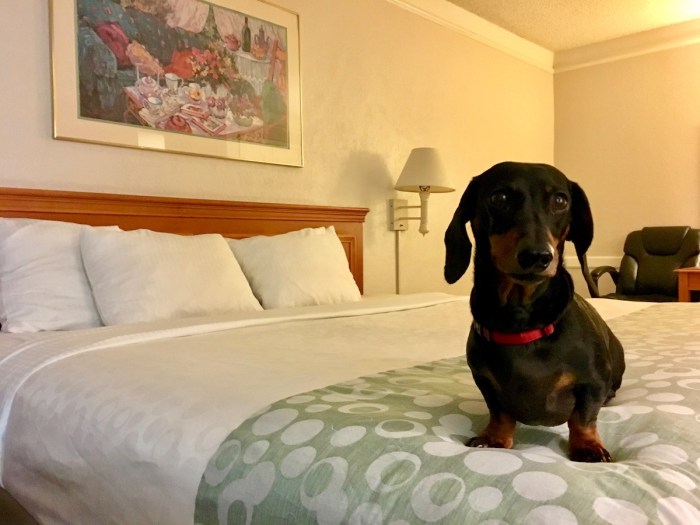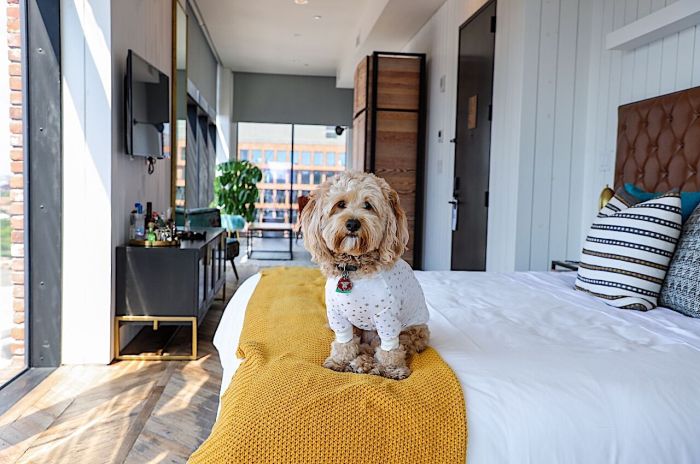
Finding the perfect vacation spot often involves considering the needs of all family members, furry friends included. The rise of dog-friendly hotels reflects a growing recognition of this, offering travelers a chance to explore new destinations without leaving their beloved companions behind. This guide delves into the world of dog-friendly accommodations, examining the amenities, policies, and overall experience to help you find the ideal getaway for you and your canine companion.
From understanding the nuances of “dog-friendly” designations – encompassing everything from basic pet allowance to dedicated dog parks on-site – to navigating the various policies and potential challenges, we aim to equip you with the knowledge to make informed decisions. We’ll explore popular destinations, helpful tips for a smooth trip, and even discuss the broader trend of pet-friendly travel and its impact on the hospitality industry.
Location and Accessibility

Choosing the right location for your dog-friendly getaway is crucial for a relaxing and enjoyable experience for both you and your furry friend. Consider not only your own preferences for activities and scenery but also the needs and comfort of your canine companion. Factors such as proximity to amenities specifically designed for dogs, and the overall accessibility of the area, will greatly impact the success of your trip.Finding a hotel that caters to your pet’s needs and provides easy access to dog-friendly activities significantly enhances your vacation.
Many popular travel destinations are now embracing pet-friendly tourism, offering a wide range of options for travelers with dogs. Careful consideration of location-specific factors will ensure a smooth and stress-free trip for everyone involved.
Popular Dog-Friendly Destinations
Several regions and cities have established themselves as hotspots for dog-friendly travel. Coastal areas often boast numerous dog-friendly beaches and walking trails, while mountainous regions provide opportunities for hiking and exploring nature. Examples include coastal towns in California, such as Carmel-by-the-Sea, known for its dog-friendly beaches and charming atmosphere; or mountainous areas in Colorado, offering numerous hiking trails suitable for dogs of various fitness levels.
Many national and state parks also welcome well-behaved dogs on designated trails, providing access to breathtaking scenery and outdoor adventures. Urban areas, too, are increasingly embracing dog-friendly policies, with many cities offering dog parks, pet-friendly restaurants, and even dedicated dog walking services.
Factors to Consider When Choosing a Dog-Friendly Hotel Location
Before booking your dog-friendly hotel, consider several crucial location-based factors. Proximity to amenities specifically designed for dogs significantly improves your trip.
- Proximity to Dog Parks: Easy access to a well-maintained dog park allows your dog to socialize and exercise, reducing stress and ensuring a happy vacation. Look for hotels within walking distance or a short drive from reputable dog parks.
- Walking Trails and Green Spaces: Hotels near scenic walking trails and green spaces provide opportunities for enjoyable walks and exploration, enriching your vacation experience.
- Veterinary Services: While you hope not to need them, having access to emergency veterinary care is essential. Choose a hotel location with nearby veterinary clinics or animal hospitals.
- Pet-Friendly Shops and Services: The presence of nearby pet supply stores, groomers, and dog walkers can add convenience and enhance your stay.
- Accessibility and Terrain: Consider the terrain surrounding the hotel. Is it easily navigable for you and your dog? Are there any significant obstacles or hazards?
Examples of Hotels Near Dog-Friendly Activities and Attractions
Numerous hotels are strategically located near popular dog-friendly attractions. For instance, many hotels in Aspen, Colorado, are close to hiking trails and dog parks, allowing easy access to outdoor adventures. Similarly, hotels near beaches in Southern California often offer direct beach access or are a short walk away from dog-friendly stretches of sand. In urban areas, hotels located near dog parks and pet-friendly restaurants offer convenience and cater to the needs of dog owners.
For example, a hotel near Central Park in New York City might offer easy access to vast green spaces and numerous dog-friendly cafes. Always verify the specific pet policies and amenities offered by individual hotels before booking.
Policies and Regulations
Pet policies are crucial for both dog-friendly hotels and their guests. Clear expectations ensure a positive experience for everyone, minimizing potential conflicts and misunderstandings. Consistent and transparent policies contribute to a hotel’s reputation and attract responsible pet owners.Understanding a hotel’s pet policy before booking is essential for guests. This allows pet owners to choose accommodations that comfortably accommodate their furry friends and avoid unexpected fees or restrictions.
Pet Size and Breed Restrictions
Many hotels implement size and breed restrictions to manage potential risks and ensure the safety and comfort of all guests. Smaller dogs are often preferred due to easier management and reduced potential for damage. Certain breeds, perceived as more aggressive or prone to destructive behavior, may be prohibited. For example, a hotel might have a weight limit of 25 pounds or exclude breeds like Pit Bulls or Rottweilers.
These restrictions are usually clearly stated on the hotel’s website and booking platforms. The rationale behind these restrictions is to maintain a safe and enjoyable environment for all guests, including those with allergies or phobias related to certain dog breeds.
Additional Fees and Deposits
Hotels typically charge additional fees for pet-friendly accommodations. These fees can vary depending on factors such as the size of the pet, the length of stay, and the specific hotel’s policies. Some hotels might charge a nightly fee, a one-time fee, or a refundable pet deposit to cover potential damages. For instance, a boutique hotel might charge $25 per night, while a larger chain hotel might have a flat fee of $50 for the entire stay.
A refundable deposit, often ranging from $100 to $300, might be required to cover any cleaning or repair costs if damage occurs. These fees are usually disclosed upfront during the booking process to allow guests to budget accordingly.
Comparison of Pet Policies Across Different Hotel Types
Pet policies differ significantly depending on the type of accommodation. Budget-friendly motels might have more lenient policies, while luxury hotels may have stricter rules and higher fees. Boutique hotels often cater to a specific clientele and may have unique pet policies reflecting their brand identity. For example, a luxury resort might offer premium pet amenities, such as dedicated pet-sitting services, while a budget-friendly motel might simply allow pets with a small additional fee.
Chain hotels often have standardized pet policies across their locations, although individual hotels may have some flexibility. Independent hotels tend to have more diverse policies, reflecting the owners’ preferences and local regulations. It’s crucial for guests to check the specific pet policy of their chosen hotel, regardless of its type or brand, to avoid any surprises.
Guest Experiences and Reviews

Positive guest experiences are crucial for the success of any dog-friendly hotel. Building a strong reputation relies on consistently exceeding guest expectations and fostering a welcoming environment for both humans and their canine companions. This section details both positive experiences and potential challenges, offering solutions to ensure a consistently positive stay.
A Positive Guest Experience
The Millers recently enjoyed a week-long stay at the “Pawsitive Stays” hotel. Their golden retriever, Gus, was welcomed with a complimentary gourmet dog biscuit and a plush toy. The spacious suite offered ample room for Gus to play, and the hotel’s private dog park, complete with agility equipment and shaded areas, provided hours of entertainment. The Millers appreciated the readily available dog waste bags and the convenient location of the pet-washing station.
The staff’s attentiveness, readily offering water bowls and information about nearby dog-walking trails, further enhanced their stay. The hotel also hosted a “Yappy Hour” social event, allowing Gus to interact with other dogs and the Millers to connect with fellow pet owners. The overall experience was so positive that the Millers booked another stay before leaving.
Challenges Faced by Guests and Mitigation Strategies
Guests staying at dog-friendly hotels may encounter several challenges. Noise complaints from other guests are a common concern. To mitigate this, hotels can implement quiet hours, provide sound-dampening materials in rooms, and clearly communicate pet policies regarding noise levels to all guests upon check-in. Another potential challenge is the management of pet waste. Hotels can address this by providing ample waste disposal stations, regularly cleaning common areas, and educating guests on responsible pet ownership.
Allergies are also a concern. The hotel can mitigate this by offering hypoallergenic rooms or designating specific areas for pet-free guests. Finally, some guests might struggle with the lack of pet-sitting services. Partnering with local pet-sitting businesses or offering in-house pet-sitting services can help alleviate this concern.
Proactive Management of Negative Experiences
Proactive measures can significantly reduce negative experiences. Thorough cleaning protocols after each pet guest departure are essential. This includes a deep clean of the room, paying close attention to pet hair and odors. Implementing a detailed pet damage policy, clearly outlining guest responsibilities and potential charges for damages, prevents misunderstandings. Training staff to handle potential pet-related incidents effectively is also crucial.
Staff should be equipped to address noise complaints, manage minor accidents, and offer assistance to guests with pet-related needs. Finally, proactively soliciting guest feedback through surveys or online reviews allows for early identification and resolution of issues, demonstrating a commitment to guest satisfaction.
Planning a trip with your dog shouldn’t be stressful; it should be an exciting adventure for both of you. By understanding the factors discussed – from choosing the right hotel with suitable amenities and policies to anticipating potential challenges and proactively addressing them – you can ensure a memorable and enjoyable experience. The growing number of dog-friendly hotels demonstrates a positive shift in the travel industry, prioritizing inclusivity and recognizing the special bond between humans and their pets.
So pack your bags, grab your leash, and embark on your next adventure together!
FAQ Resource
What are typical additional fees for bringing a dog to a hotel?
Fees vary widely, ranging from a small nightly charge to a one-time pet fee. Some hotels may also charge a cleaning fee, particularly for larger dogs or if there is damage.
Are there any weight or breed restrictions?
Yes, many hotels have weight and breed restrictions. Always check the hotel’s pet policy beforehand to ensure your dog meets their requirements.
What should I do if my dog has an accident in the hotel room?
Immediately notify the hotel staff. Most hotels will have a procedure in place to handle such situations and may have cleaning supplies available.
How can I find dog-friendly activities near my hotel?
Utilize online search engines, review sites, and local tourism websites. Many websites and apps specialize in listing dog-friendly parks, trails, and attractions.




